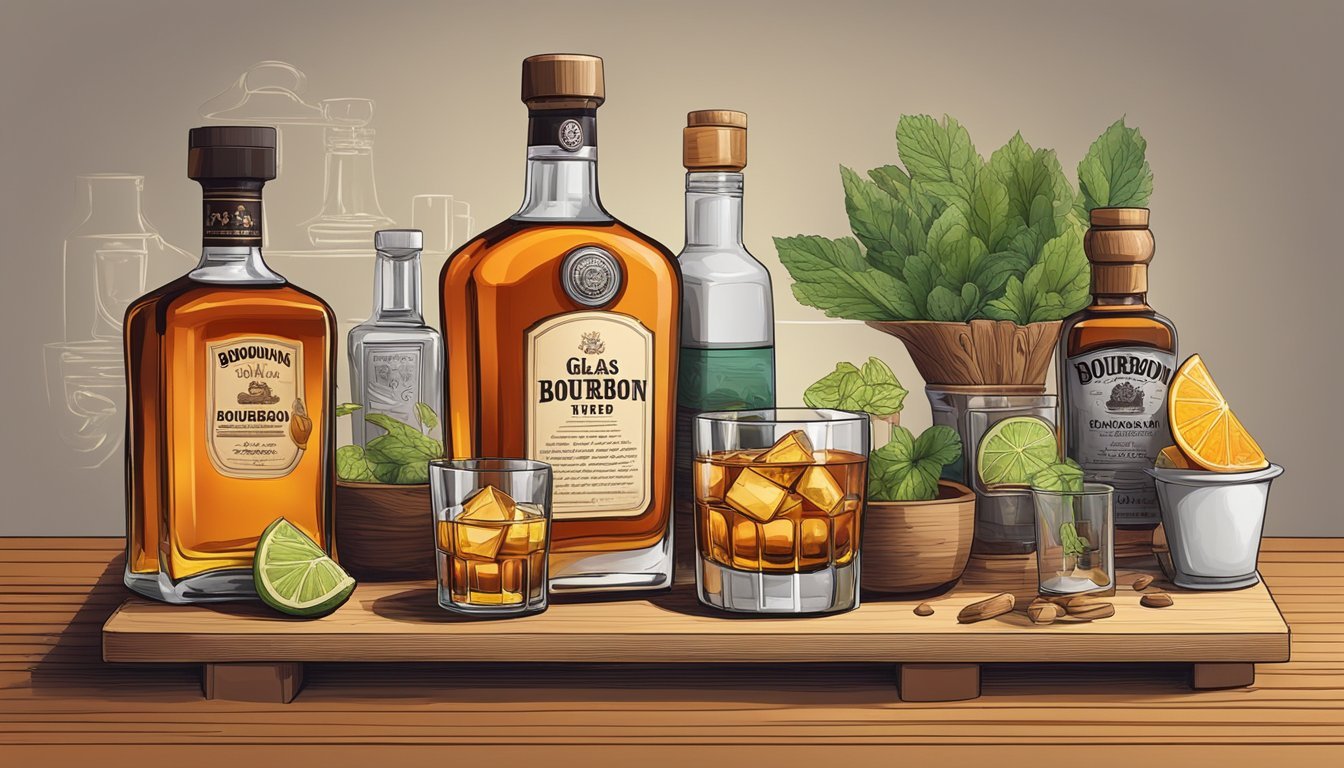Bourbon Substitutes
Top Alternatives for Your Recipes and Cocktails
Bourbon, a type of American whiskey, is cherished for its rich, complex flavors with undertones of vanilla, oak, and caramel. In cooking and baking, it adds depth and a uniquely warm sweetness to various dishes, from savory meat glazes to decadent desserts. However, there are situations where a replacement is necessary, whether due to availability, dietary preferences, or a desire for a non-alcoholic option.
Fortunately, there are several bourbon substitutes that can approximate its flavor profile. Alcoholic alternatives like cognac, scotch, and brandy possess their own distinct flavors but can stand in effectively for bourbon, bringing in similar notes of richness and refinement. On the other hand, non-alcoholic substitutes including a mix of vanilla and almond extracts or a blend of coffee, brown sugar, and molasses can offer a compatible flavor palette for those avoiding alcohol.
Among the various options, each substitute brings a different dimension to the dish, allowing for versatility and creativity in the kitchen. Chefs and home cooks can select alternatives that not only mimic bourbon's characteristics but can also enhance the overall taste of their culinary creations. Whether the goal is to retain the original essence of a recipe or to introduce a new twist, understanding the flavor profiles and applications of these substitutes is key to a successful replacement.
Understanding Bourbon and Its Unique Flavor
To appreciate the nature and versatility of bourbon, one must first understand its fundamental attributes and the distinct flavor profile that sets it apart from other spirits.
The Basics of Bourbon
Bourbon is an American whiskey primarily distilled from a fermented mash containing at least 51% corn. The spirit must be aged in new, charred oak barrels, which contribute to its rich flavor and amber color. Under U.S. law, bourbon production must take place in the United States, and no additives are permitted in genuine bourbon whiskey.
Characteristics of Bourbon Flavor
The flavor profile of bourbon is complex and can vary depending on the specific mash bill, aging process, and the distillery's practices. Common flavor notes include:
Sweetness: Derived from the corn base.
Vanilla and Caramel: The result of aging in charred oak barrels.
Bourbon Vanilla Extract: An extract that can encapsulate bourbon’s essence with its concentrated vanilla flavor, often used as a non-alcoholic substitute.
Smoky: A subtle tone from the charring of the barrels.
These flavors can range from bold and spicy to smooth and sweet, giving bourbon a multifaceted character that is celebrated by enthusiasts worldwide.
Bourbon in Cooking
Chefs and home cooks often incorporate bourbon into their dishes, leveraging its flavor profile to enhance both sweet and savory recipes. Bourbon can complement the taste of various foods, including meats and desserts, imparting notes of vanilla and caramel that add depth to the overall flavor of a dish. When bourbon is not available, bourbon vanilla extract can serve as a non-alcoholic substitute that still offers a similar aroma and taste, especially in baked goods.
Alcoholic Alternatives to Bourbon
When looking for an alternative to bourbon in cooking or cocktails, certain spirits are preferable based on their flavor profiles and characteristics. Whiskies of various types, cognac, rum, and other distilled spirits can appropriately mimic the complexity and essence of bourbon.
Comparison to Other Whiskies
One can consider Scotch whisky and American whiskey types, like rye whiskey, as close substitutes due to their similar distillation processes. Scotch whisky often brings a smoky flavor to the table, which works well in heavier dishes or robust sauces. Meanwhile, rye whiskey, another whiskey variant, provides a spicier, fruitier taste, making it a good match for the sweetness of bourbon.
Brandy and Cognac as Substitutes
Brandy and Cognac serve as excellent substitutes for bourbon, particularly in desserts and baked goods. Cognac, a type of brandy, offers a rich, fruity, and nutty profile that can replace bourbon's caramel and vanilla notes. When selecting brandy, one should choose those that are aged to ensure a deeper flavor closer to that of bourbon.
Using Rum for Sweetness
Rum is a sugarcane-based spirit that can substitute for bourbon to enhance sweetness. Dark or spiced rums are preferable, as they more closely mimic the complexity of bourbon. Rum can be particularly effective in desserts, lending a deep molasses-like sweetness which complements ingredients such as chocolate or fruit.
Exploring Other Spirits
There are several other spirits that one might not initially consider but which can act as substitutes for bourbon. Some of these include wallet-friendly options like generic whiskies that still provide the warmth and richness needed. Distilled spirits should be chosen carefully based on the desired flavor outcome of the dish or drink in which bourbon is being replaced.
Non-Alcoholic Bourbon Substitutes
When cooking or mixing drinks requires the flavor of bourbon without the alcohol, non-alcoholic substitutes can deliver similar taste profiles. These substitutes range from extracts and essences to fruit juices, vinegars, and even warm beverages, providing a spectrum of flavors to match bourbon's complexity.
Extracts and Essences
Vanilla Extract: An excellent non-alcoholic substitute for bourbon is vanilla extract, due to its depth and warmth, which mimics bourbon's sweet undertones.
Almond Extract: For a nutty flavor that resembles the oaky notes found in bourbon, almond extract—both alcoholic and non-alcoholic almond extract—is a great choice.
Fruit Juices and Vinegars
Apple Cider Vinegar: Adds a tangy kick with a touch of sweetness, substituting for bourbon’s acidity in savory dishes.
Fruit Juice: Juices such as apple, grape, or pomegranate offer a fruity complexity and can mimic some of bourbon's sweetness and tartness.
Substituting with vinegar or juices may require adjusting the sweetness with additional honey or molasses depending on the desired outcome.
Hot Beverages and Syrups
Coffee: Strongly brewed coffee can replace bourbon to deliver a rich, bold flavor in many recipes.
Hot Cocoa and Warm Eggnog Mixture: This combination can approximate bourbon's creamy and spiced profile, suitable for dessert applications.
Sweetening agents like molasses can add the caramel notes commonly associated with bourbon, while honey can provide the necessary sweetness and smoothness in non-alcoholic mixes.
Cooking with Bourbon Substitutes
Choosing the right substitute for bourbon in cooking is essential to maintaining the integrity of the dish's intended flavor profile. Whether in baking applications, preparing meat dishes and marinades, or crafting desserts and sweet dishes, an appropriate replacement will complement the food without dominating its taste.
Baking Applications
Baked goods often benefit from the unique flavors that bourbon imparts, particularly desserts like pecan pie or bread pudding. When bourbon is unavailable, a suitable alternative can be found in other spirits or non-alcoholic options:
Cognac: It's an excellent choice for bringing a warm, floral, and woody depth to cakes and pastries.
Scotch: Although typically enjoyed as a beverage, its complex richness suits savory baked goods.
For a non-alcoholic version, a syrup made of sugar and water can be flavored with vanilla or almond extracts to mimic bourbon's sweetness and depth.
Meat Dishes and Marinades
The robust, sweet notes of bourbon can enhance meat dishes, such as roasted pork or cognac shrimp recipes:
Scotch or Brandy: Either can be used in marinades to infuse chicken or pork with a savory, complex flavor.
Juices for Non-Alcoholic Options: Apple, orange, and grape juice combined offer a fruity zest to sauces and marinades, bringing out the natural flavors of the meat without the need for alcohol.
Desserts and Sweet Dishes
Bourbon is often a go-to for desserts and sweet dishes due to its rich and slightly sweet profile. Substitutes need to maintain the texture and taste of the original recipe without overpowering other ingredients:
Peach Nectar and Apple Cider Vinegar Mixture: This combo is excellent in fruit-based desserts, providing sweetness and a tangy kick.
Non-alcoholic Substitutes: Vanilla extract, diluted with water, can replace bourbon, granting a sweet and slightly floral aroma perfect for desserts like sugar-glazed pastries or creamy sauces.
Advanced Insights into Bourbon Substitution
In exploring the depth of bourbon substitutes, one must consider the tasting notes and their influence on recipes, striking a balance between flavor and outcome, especially when opting for non-alcoholic alternatives.
Tasting Notes and Flavor Pairings
When substituting bourbon, replicating its complex flavors — which include hints of vanilla, caramel, and smokiness — is paramount. For savory dishes, whiskies like Scotch or Cognac can impart a rich flavor profile similar to bourbon's. For a sweeter touch, vanilla extract can be a match in baked goods due to its potent flavor. However, while peach nectar and apple cider vinegar mixture can echo bourbon's fruitiness and acidity in sauces, balancing is key to matching the subtlety of the original profile.
Impacts on Recipe Outcomes
The choice of substitute can significantly affect the final taste and texture of a dish. Non-alcoholic options may lack the body bourbon provides; hence using alternatives like dark beer or grape juice in barbeque sauces can lend the required depth. Amarula offers a creaminess that suits puddings and desserts, while rye can bring a spicy edge to meat marinades. Ginger beer can be a bold choice, particularly for fruit-based dishes, providing a sharp, spirited flavor without the alcohol.
Creating Non-Alcoholic Concoctions
Offering non-alcoholic bourbon substitutes without sacrificing the authentic taste involves creativity. A mix of apple juice, sugar, and a hint of molasses offers a surprisingly similar profile for pies and sweet sauces. To mimic bourbon in cocktails, non-alcoholic spirits or a blend of peach nectar, ginger, and a dash of bitters may provide the complex, multi-layered taste desired. For a non-alcoholic base to mellow rich desserts, beer or wine replacements must be carefully chosen to avoid overpowering the dish.




